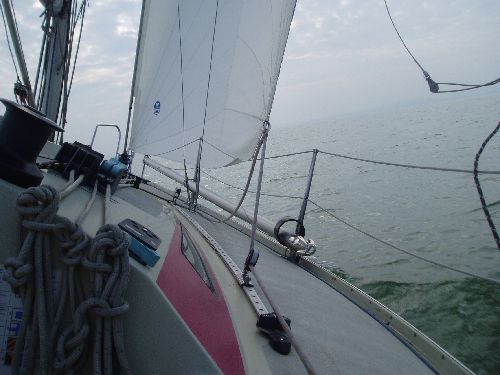Review of Banner 28 Racer Mk II


Basic specs.

Looking for a new boat? Find a Banner 28 Racer Mk II or similar boat for sale
The hull is a double hull which improves the indoor climate. Especially when the water is colder than the air in the cabin, then the double hull insulates against cold water and reduce the condense water in the cabin.
The deck is a double deck which improves the indoor climate.
The boat is equipped with one cabin, 4 berths and a galley.
Note: the boat has also been sold to be self-made/-interiored, which means that the quality of each boat may vary.
The Banner 28 Racer Mk II is equipped with a fin keel. A boat with a fin keel is more manoeuvrable but has less directional stability than a similar boat with a long keel.
The keel is made of iron. Many people prefer lead keel in favour of iron. The main argument is that lead is much heavier than iron and a lead keel can therefore be made smaller which again result in less wet surface, i.e. less drag. In fact iron is quite heavy, just 30% less heavy than lead, so the advantage of a lead keel is often overstated. As the surface of a fin type keel is just a fraction of the total wet surface, the difference between an iron keel and a lead keel can in reality be ignored for cruising yachts.
Banner 28 Racer Mk II can enter even shallow marinas as the draft is just about 1.35 - 1.45 meter (4.43 - 4.73 ft) dependent on the load. See immersion rate below.
An outboard motor is often used on this boat. In that case the boat will typically require a power of 0 - 1 hp, alternatively 0 - 1 lbs thrust if you prefer an electrical motor. Electric outboards are becoming popular for sailboat owners who want clean instant power with less noise and no exhaust fumes.
Sailing characteristics
This section covers widely used rules of thumb to describe the sailing characteristics. Please note that even though the calculations are correct, the interpretation of the results might not be valid for extreme boats.
What is Theoretical Maximum Hull Speed?
The theoretical maximal speed of a displacement boat of this length is 6.0 knots. The term "Theoretical Maximum Hull Speed" is widely used even though a boat can sail faster. The term shall be interpreted as above the theoretical speed a great additional power is necessary for a small gain in speed.
The immersion rate is defined as the weight required to sink the boat a certain level.
The immersion rate for Banner 28 Racer Mk II is about 120 kg/cm, alternatively 672 lbs/inch.
Meaning: if you load 120 kg cargo on the boat then it will sink 1 cm.
Alternatively, if you load 672 lbs cargo on the boat it will sink 1 inch.
Sailing statistics
This section is statistical comparison with similar boats of the same category. The basis of the following statistical computations is our unique database with more than 26,000 different boat types and 350,000 data points.
What is L/B (Length Beam Ratio)?
The l/b ratio for Banner 28 Racer Mk II is 2.89.
The ballast ratio for Banner 28 Racer Mk II is 39%.
What is Relative Speed Performance?
The Relative Speed Performance for Banner 28 Racer Mk II is 96
Maintenance
When buying anti-fouling bottom paint, it's nice to know how much to buy.
The surface of the wet bottom is about 20m2 (215 ft2).
Based on this, your favourite maritime shop can tell you the quantity you need.
Note: If you use a paint roller you will need more paint than if you use a paintbrush.
If you need to renew parts of your running rig and is not quite sure of the dimensions, you may find the estimates computed below useful.
| Usage | Length | Diameter | ||
| Jib sheet | 8.5 m | (27.9 feet) | 10 mm | (3/8 inch) |
| Genoa sheet | 8.5 m | (27.9 feet) | 10 mm | (3/8 inch) |
| Mainsheet | 21.2 m | (69.7 feet) | 10 mm | (3/8 inch) |
| Spinnaker sheet | 18.7 m | (61.4 feet) | 10 mm | (3/8 inch) |
This section shown boat owner's changes, improvements, etc. Here you might find inspiration for your boat.
Do you have changes/improvements you would like to share? Upload a photo and describe what to look for.
We are always looking for new photos. If you can contribute with photos for Banner 28 Racer Mk II it would be a great help.
If you have any comments to the review, improvement suggestions, or the like, feel free to contact us. Criticism helps us to improve.
